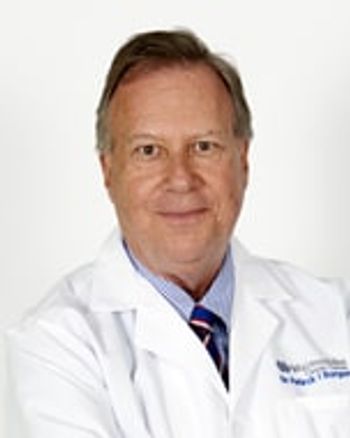
Oncology NEWS International
- Oncology NEWS International Vol 17 No 3
- Volume 17
- Issue 3
RAD001 increases letrozole’s anti-breast cancer activity
In the neoadju-vant setting, adding the investigational agent RAD001 (everolimus) to letrozole (Femara) improves antitumor activity in breast cancer patients, with a tradeoff of some increased toxicity, according to results presented at the San Antonio Breast Cancer Symposium (abstract 2066).
SAN ANTONIO-In the neoadju-vant setting, adding the investigational agent RAD001 (everolimus) to letrozole (Femara) improves antitumor activity in breast cancer patients, with a tradeoff of some increased toxicity, according to results presented at the San Antonio Breast Cancer Symposium (abstract 2066).
“With the combination of this mTOR inhibitor (RAD001) and letrozole, we were hoping to overcome initial resistance to letrozole, so the hypothesis was that we could increase the response rate by combining letrozole with RAD001,” co-author Jutta Steinseifer, MD, MBA, told ONI in an interview. “The second objective was to identify a predictive marker for response to the combination.”
The 270 women enrolled in the phase II double-blind, randomized trial were postmenopausal, had untreated, ER-positive breast cancer with a palpable tumor confined to one quadrant of the breast and measuring greater than 2 cm by imaging, and were candidates for mastectomy or lumpectomy, said Dr. Steinseifer, an investigator with Novartis Pharma AG in Switzerland. Lead author of the study was Jose Baselga, MD, of Barcelona.
The patients were assigned to 16 weeks of treatment with letrozole 2.5 mg/d plus either placebo or oral RAD001 10 mg/d, followed by surgery.
With the P value cutoff of 0.1 used in the trial, women receiving the combination therapy had a significantly higher rate of overall response, compared with those receiving monotherapy, according to clinical criteria (68% vs 59%, P = .06; see Table) and ultrasound criteria (58% vs 47%, P = .035).
The rate did not differ according to mammographic criteria (36% vs 39%). However, Dr. Steinseifer noted that a substantial proportion of patients had missing mammograms.
“We did see more adverse events on RAD001, which was expected, and they were the common toxicities well known for RAD001,” she said, notably stomatitis, rash, thrombocytopenia, and asthenia.
Compared with monotherapy, the combination was associated with higher rates of adverse events (90% vs 64%), serious adverse events (11% vs 5%), and adverse events requiring dose adjustment or interruption (55% vs 8%).
The most common grade 3-4 adverse events seen in at least two patients in the combination arm were hyperglycemia (5%), stomatitis (2%), infections (2%), and interstitial lung disease/pneumonitis (2%). All cases of the last toxicity resolved with discontinuation of RAD001.
The rate of discontinuation due to adverse events was 9% in the RAD001 plus letrozole group and 2% in the letrozole-only group, whereas the rate of discontinuation due to progression was 2% in the former group and 5% in the latter group.
“Actually, 46.4% of the patients could not take RAD001 for the full 4 months because of toxicity,” Dr. Steinseifer commented. “So the results that we are seeing-the superior efficacy-occurred in spite of the fact that not all of the patients could take the full 4-month treatment.”
Dr. Steinseifer concluded that “we did meet our objective; we did show that RAD001 significantly increases the anti-tumor activity of letrozole in this patient group. The safety profile is generally acceptable and it is consistent with historical data, but RAD001 does add significant toxicity to letrozole, which is a very well tolerated treatment.”
The team is conducting extensive correlative biomarker studies, with the aim of identifying women most likely to benefit from the combination (see SABCS abstract 4006).
“We believe that with this compound, we will not be successful if we perform a phase III trial just in an unselected population,” she explained.
In terms of other groups that might benefit, Dr. Steinseifer noted, “We know there are tumors that are de novo resistant to endocrine therapy and that, apparently, we are catching some of these because we did have a higher efficacy with the combination. What we don’t know, of course, is whether this treatment would be even more beneficial in a later setting, where we would be looking at acquired resistance to letrozole.”
Therefore, she said, if a predictive biomarker is identified, the team plans to test the combination in patients with metastatic disease.
Articles in this issue
about 18 years ago
Recentin headed to phase III in first-line colon caabout 18 years ago
Topo 2 alpha test FDA approvedabout 18 years ago
RFA provides sustained pain relief in osteoid osteomaabout 18 years ago
Renal ca surgery often determined by doctors’ practice styleabout 18 years ago
Partial nephrectomy underutilized for small renal tumorsabout 18 years ago
Most older men with early-stage cancer can avoid treatmentabout 18 years ago
SERM reduces ADT side effectsabout 18 years ago
New serum biomarker appears to detect colon cancerabout 18 years ago
Hypofractionated IMRT does not increase sexual side effectsabout 18 years ago
Surface mapping aligns patients for external beam PBINewsletter
Stay up to date on recent advances in the multidisciplinary approach to cancer.
Related Content



Molecular Interception: Discussing the Future of Surgery in Breast Cancer

Lessons From the Withdrawal of Atezolizumab in Metastatic TNBC

















































